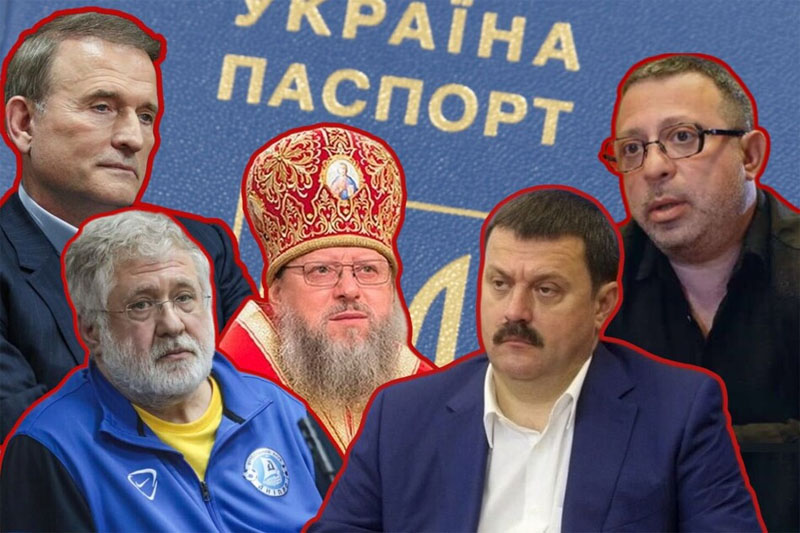Медведчук и все-все-все. Кто хочет вернуть украинский паспорт


Жертвы президентских указов с несколькими паспортами массово побежали в суды
После начала полномасштабной российской агрессии президент Владимир Зеленский начал системно лишать украинского гражданства одиозных лиц. Происходило это волнами, президентские указы содержали сразу по несколько фамилий. Техническое основание для таких радикальных решений было одно — наличие у таких лиц гражданства других стран. Хотя в январе этого года президент зарегистрировал в Верховной Раде законопроект «О некоторых вопросах в сфере миграции относительно оснований и порядка приобретения и прекращения гражданства Украины», который предусматривает множественное гражданство. Правда, «вне игры» в любом случае остаются граждане страны-агрессора, которые сейчас и преобладают в списке тех, кому аннулировали украинские паспорта.
Жизненный путь и отношения с властью у тех, у кого забрали паспорт с трезубцем, разный: вряд ли можно сравнивать «вину» Игоря Коломойского, Виктора Медведчука, топ-чиновников эпохи Януковича и ватаги контрабандистов. Некоторые из этих лиц не согласились с потерей украинского паспорта и пытаются вернуть его через суды. Среди них — и те экс-граждане, которые давно сбежали из Украины, и те, кто до сих пор в ней находится в туманном статусе.
Начал не Зеленский
Прекращение украинского гражданства известных персон было начато еще при президентстве Петра Порошенко. В апреле 2017 года он издал соответствующий указ в отношении экс-нардепа от Радикальной партии Ляшко Андрея Артеменко. Это произошло вскоре после того, как издание The New York Times опубликовало статью о том, что украинский депутат передал администрации тогдашнего президента США Дональда Трампа план решения конфликта на Донбассе, который предусматривает вывод российских войск с Донбасса, снятие санкций с России и проведение референдума о передаче Крыма в аренду России.
В Украине такой поступок, мягко говоря, не поддержали, в частности, коллеги-депутаты Артеменко, а Генпрокуратура начала расследование по признакам государственной измены. У Артеменко быстро нашли канадский паспорт, о существовании которого он сам сообщил во время допроса. Правда, депутат отметил, что аннулировал его, как только избрался в парламент, но канадское гражданство продолжало действовать. Это стало основанием для Петра Порошенко издать указ о прекращении украинского гражданства Артеменко и еще пяти человек, среди которых — экс-заместитель министра экономики Саша Боровик.
Такой шаг сразу вызвал критику среди правозащитников: они ссылались на статью 25 Конституции, которая четко определяет, что гражданин Украины не может быть лишен гражданства и права изменить гражданство. С другой стороны, закон о гражданстве называет основанием для его потери приобретение гражданства другой страны. Эту коллизию должен был бы растолковать Конституционный суд, но его позиции, как и по другим важным вопросам, просто нет. Поэтому юристы Порошенко тогда решили это разночтение по своему усмотрению. Акцент был сделан на том, что в президентском указе речь шла не о лишении, которое запрещено Конституцией, а лишь о прекращении гражданства (которое гипотетически когда-то можно восстановить). По такой же схеме впоследствии было прекращено и украинское гражданство Михаила Саакашвили. Его обвинили в том, что при получении украинского паспорта он скрыл информацию о своих судимостях в Грузии.
Интересно, что одним из первых указов новоизбранный президент Владимир Зеленский Саакашвили гражданство вернул. Также он предоставил украинское гражданство российскому оппозиционеру Александру Невзорову и ряду лиц, которые принимали участие в защите территориальной целостности, суверенитета и независимости Украины.
Более того, Зеленский заверил, что отныне с его стороны не будет искусственного торможения или затягивания этого процесса, как во времена предшественника. И заявил, что вообще готов предоставить гражданство «всем украинцам на планете».
Но в то же время после начала широкомасштабного вторжения Зеленский, руководствуясь логикой военного времени, начал не только выдавать гражданство, но и отбирать его. Причем украинский паспорт аннулировали преимущественно не тем, кому он был подарен, а лицам, которые жили в Украине со времен ее независимости. «Первые ласточки» пролетели еще в апреле 2021 года: глава государства лишил гражданства бизнесменов Вадима Альперина, Араика Амирханяна и Александра Еримичука. Это произошло после заседания СНБО, где были введены персональные санкции в отношении лиц, возглавляющих так называемую топ-десятку украинских контрабандистов. Альперина лично Зеленский называл «крестным отцом контрабанды в Украине». Формальным основанием для потери Альпериным украинского гражданства было параллельное гражданство Израиля, Амирханяном — гражданство Армении, а Еримичуком — Румынии.
Вопрос потери гражданства решает Комиссия при президенте Украины по вопросам гражданства. Представление в эту комиссию могут внести государственные и правоохранительные органы, которые обнаружили основания для потери гражданства (например, наличие действующего паспорта иностранного государства).
По итогам заседания комиссия принимает решение внести на рассмотрение президента предложение об удовлетворении представления об утрате гражданства Украины. Председатель Комиссии направляет это предложение президенту вместе с проектом указа. Указ президента можно обжаловать только в Верховном Суде.
Уже после начала большой войны в июле 2022-го Зеленский издал указ, которым прекратил гражданство ряда знаковых лиц: среди них оказались бывший глава Днепропетровской обладминистрации Игорь Коломойский и его экс-заместитель Геннадий Корбан. Оба были столпами так называемого «днепропетровского клана», а Коломойский — еще и бизнес-партнером Зеленского времен «95 квартала». Сейчас Коломойский находится в СИЗО СБУ по обвинению в финансовых махинациях в Приватбанке до его национализации. Вопросы к олигарху есть и у ФБР. Основанием для лишения гражданства Коломойского и Корбана стали израильские паспорта, существование которых они даже не скрывали.
Вместе с Корбаном и Коломойским в списке лишенных паспорта появились два нардепа — Вадим Рабинович из запрещенной прокремлевской ОПЗЖ и Игорь Васильковский из «Слуги народа». У Рабиновича прогнозируемо нашлось гражданство Израиля, куда некогда пылкий «голубь мира» сбежал еще перед вторжением, а историю с одним из самых больших прогульщиков Васильковским и его болгарским паспортом не очень поняли даже его бывшие соратники из монобольшинства.
Указы о потере гражданства не публикуются в открытом доступе из-за наличия персональной информации, и это еще больше добавляет процессу секретности. Например, указ «имени Коломойского-Корбана» впервые был обнародован… на «фейсбуке» нардепом от «Батькивщины» Сергеем Власенко.
Через пару месяцев — в сентябре 2022-го — президент лишил гражданства еще четырех контрабандистов из вышеупомянутого списка СНБО, которые имели российские и румынские документы. А в декабре того же года аналогичная процедура была применена к 13 служителям УПЦ МП, среди которых — митрополит Тульчинский и Брацлавский, которого подозревают в госизмене и который имеет российский паспорт.
В январе 2023-го Зеленский взялся уже за «крупную рыбу» и откровенную агентуру Кремля. Он сам сообщил, что лишил гражданства нескольких нардепов от ОПЗЖ — путинского кума Виктора Медведчука, его ближайшего соратника Тараса Козака и экс-генпрокурора Рената Кузьмина. К этой «медведчуковской» компании добавился еще и долгожитель Верховной Рады семи созывов внефракционный Андрей Деркач, который по данным СБУ, давно был завербован российскими спецслужбами для непосредственного участия в захвате Россией Украины. Весь этот квартет был обвинен в государственной измене. «Если народные избранники выбирают службу не народу Украины, а убийцам, которые пришли в Украину, то и наши действия будут соответствующими. И это не последние подобные решения», — пообещал Зеленский, пожелав тем, кто имеет российское гражданство, жить в их любимой стране.
4 февраля 2023 года Зеленский в своем видеообращении рассказал, что подписал соответствующие документы «для защиты и очистки нашего государства от тех, кто на стороне агрессора». Президент сказал, что руководствовался представлением Службы безопасности о наличии у определенных лиц российского гражданства. Фамилий президент не озвучил, но, по данным источников в правоохранительных органах, очередными гражданами, у которых отобрали гражданство Украины, стали представители печально известной команды Януковича: экс-министр образования Дмитрий Табачник, экс-министр внутренних дел Виталий Захарченко, бывший глава Администрации президента Андрей Клюев, экс-глава СБУ Александр Якименко и экс-министр доходов и сборов Александр Клименко.
Конечно, не все из тех, кого глава государства уже успел лишить гражданства, так уж желают его вернуть. Многие уже давно махнули рукой на Украину и осели в новых краях. Но хватает и тех, кто даже из-за границы судится с президентом за право восстановить украинский паспорт.
Волокита за паспорт
Объявленный президентом «главным контрабандистом» Вадим Альперин обжаловал указ президента в части потери им гражданства еще в 2021 году. Но безуспешно. Кассационный административный суд в составе Верховного Суда пришел к выводу: оспариваемый указ был издан на основе, в пределах полномочий и способом, предусмотренными Конституцией и законами Украины. Также суд учел решение ЕСПЧ по делу «Рамадан против Мальты», в котором говорится о том, что прекращение государством гражданства лица по основаниям, определенным законом, вследствие приобретения гражданства другого государства в этом деле не является нарушением Конвенции о защите прав человека и основных свобод.
Впрочем, неудача Альперина не остановила других несогласных «украинских патриотов». Виктор Медведчук, который так ждал в Украине российские войска, покинул ее в сентябре 2022 года, когда его как очень ценного путинского кадра обменяли на 200 пленных украинских защитников. После лишения гражданства Медведчук через месяц обратился в Верховный Суд о признании положений президентского указа безосновательными. По мнению представителей истца, указ президента является «незаконным, безосновательным, произвольным, принятым с нарушением норм Конституции Украины, Закона Украины «О гражданстве Украины» и грубо нарушающим права, свободы и законные интересы истца. 23 февраля 2023 года суд открыл производство по этому делу, а 17 октября 2023 года СБУ подала заявление о закрытии производства.
Служба безопасности утверждала, что настоящей целью иска Медведчука является не возвращение ему гражданства Украины, которую он называл «Антироссией», а «выражение им протеста против существующего в Украине демократического политического режима и создание предпосылок для решения других правовых вопросов». В январе этого года суд отказал СБУ в удовлетворении заявления о закрытии производства.
Кроме гражданства, через Верховный суд Медведчук пытается вернуть себе депутатский мандат и заодно избавиться от экономических санкций, введенных СНБО еще в 2021 году. Иск о возвращении депутатского мандата защита Медведчука подала в феврале 2023 года, но сейчас он на паузе до решения по делу о гражданстве.
Коллега Медведчука по «паспортному» несчастью Андрей Деркач также требует признать недействительным и отменить указ президента. На этом этапе суд по просьбе истца разрешил привлечь к участию в деле третьих лиц, не заявляющих самостоятельных требований относительно предмета спора — Государственную миграционную службу, Комиссию при президенте Украины по вопросам гражданства, Службу безопасности.
Из «птиц Януковича» судится за возвращение гражданства Андрей Клюев, соответствующий иск в Верховный Суд он подал в августе 2023-го. Клюев через своего адвоката доказывал: президентский указ надо отменить, поскольку нарушена статья 7 Европейской конвенции о гражданстве и статья 8 Конвенции о сокращении без гражданства. Также истец клялся, что не обращался в российские органы власти с заявлением о получении гражданства, и подкрепил слова письмом-ответом от управления по вопросам миграции МВД РФ на запрос российского адвоката. Клюев просил суд не принимать во внимание скриншоты и выдержки из российских сайтов «Егрн-Документ» и АС «Российский паспорт», предоставленные СБУ как доказательства получения им паспорта гражданина России. Мол, эта информация является сомнительной. Впрочем 5 февраля этого года Верховный Суд полностью отказал Клюеву в обжаловании президентского указа. Решение пока не вступило в силу, потому что у истца есть время на апелляцию.
Вместе с политиками жалуется на президентскую несправедливость митрополит Черновицкий и Буковинский Мелетий (Егоренко Валентин Владимирович), который оказался в списке 13 служителей УПЦ МП с российскими паспортами. На последнем заседании в декабре прошлого года суд разрешил ответчику — представителю президента привлечь к участию в деле Службу безопасности как третье лицо, не заявляющее самостоятельных требований относительно предмета спора.
Отдельная история — эпопея с увольнением и восстановлением в должности скандального судьи Верховного Суда Богдана Львова. В сентябре 2022 года журналисты программы «Схемы» обнаружили, что Богдан Львов имеет гражданство России. Позже СБУ подтвердила этот факт. Вопрос лишения украинского гражданства Львова не стоял, но после этого был запущен процесс его увольнения. В то же время Львов все отрицает: он уверяет, что СБУ не подтвердила и не опровергла информацию о наличии у него российского паспорта. 10 января 2024 года Киевский окружной административный суд восстановил Богдана Львова в должности судьи Верховного Суда и постановил выплатить ему заработную плату «за время вынужденного прогула». Это решение в силу не вступило, а Шестой апелляционный административный суд 12 февраля открыл производство по жалобе Верховного Суда, который не согласен с решением о восстановлении Богдана Львова в должности судьи.
Некогда «ожесточенные соратники» Геннадий Корбан и Игорь Коломойский, отношения между которыми давно существенно охладели, также судятся с государством — каждый отдельно. Корбан подал иск в Верховный Суд в ноябре прошлого года. По мнению истца, указ Зеленского противоречит нормам статьи 25 Конституции, которая запрещает лишение гражданина. Сторона Корбана утверждает, что применение статьи 19 Закона Украины «О гражданстве Украины» (относительно того, что добровольное приобретение гражданином Украины гражданства другого государства является основанием для утраты гражданства) «является лишь попыткой обойти конституционный запрет лишения гражданства путем подмены понятий… отсутствие воли истца прекратить украинское гражданство и прекращение гражданства истца через якобы законодательно предусмотренную процедуру потери является фактическим лишением истца гражданства Украины, что противоречит Конституции Украины». Вместе с тем, истец отмечает, что положения Конституции и закона о гражданстве не содержат запрета иметь множественное гражданство. Суд удовлетворил ходатайство Корбана об истребовании у Офиса президента копии соответствующего указа и ряд документов, среди которых копия письма СБУ от 1 июля 2022 года относительно добровольного приобретения Корбаном израильского гражданства.
Но наиболее публичным является судебный процесс по потере гражданства Игорем Коломойским. Эта тяжба продолжается параллельно с другим громким процессом: днепровскому олигарху вручены три подозрения, которые касаются незаконных схем вывода средств из Приватбанка. Коломойского уже полгода держат в СИЗО, а судебные заседания широко освещаются СМИ, входящими в медиаимперию обвиняемого. Коломойский никогда не скрывал, что кроме гражданства Украины, имеет также гражданства Израиля и Кипра. Более того — хвастался этим, утверждая, что украинская Конституция запрещает иметь двойное, а не тройное гражданство.
Впрочем, сейчас юристы олигарха руководствуются не такими издевательскими аргументами. Они указывают, что права их клиента нарушила, в частности, засекреченная процедура выдачи президентских указов, а рассмотрение дела умышленно затягивается ответчиком.
В ноябре 2023 года Коломойский подал исковое заявление в Кассационный административный суд в составе Верховного Суда об отмене указа в части утраты им гражданства. Иск был рассмотрен сначала на этапе принятия производства Верховным Судом и его постановили оставить. Впоследствии стороной Коломойского было подано заявление уже с исправленными недостатками — добавлены данные и информация о сроках, когда он узнал о существовании указа президента. Адвокаты акцентируют на том, что никто этого указа их клиенту не посылал, должным образом в соответствии с предусмотренным законом порядком не сообщал и фактически Коломойский о потере своего гражданства услышал в СМИ.
«Коломойский узнал об этом указе непосредственно 15 сентября 2023 года, когда ему вручали ходатайство об изменении меры пресечения в уголовном производстве, — утверждает адвокат Кристина Ямельская, которая занимается делом о гражданстве миллиардера, — Так как у нас дается срок полгода на обжалование решений органов власти, то в рамках этого срока он подал исковое заявление, поскольку категорически не соглашался с существованием такого указа в принципе. Чтобы выяснить причины утраты гражданства, были направлены уточняющие адвокатские запросы. Нам ответили что правовым основанием является пункт 1 части 1 статьи 19 закона «О гражданстве Украины», который предусматривает, что учитывая добровольное приобретение гражданином гражданства другой страны, а в данном случае это гражданство государства Израиль, он теряет украинское гражданство. Не было никакого волеизъявления в отношении этого самого господина Коломойского, который здесь проживает, имеет большой бизнес, владеет движимым и недвижимым имуществом, поддерживает благотворительные, общественные проекты и имеет другие довольно устойчивые связи с Украиной. Конечно, потеря гражданства влияет на его правовой статус — например, право избирать и быть избранным на выборах. То есть это существенное сужение и ограничение политических и гражданских прав».
Основное основание, на котором строится защита, — закон не имеет обратной силы. Коломойский получил гражданство Израиля, пользуясь своим еврейским происхождением, в 1995 году. А Конституция Украины в этой редакции (где предусмотрено единое гражданство) вступила в силу только в 1996 году. К тому же, по мнению юристов, в законодательстве нет прямого запрета на двойное или множественное гражданство: там лишь закреплен принцип единого гражданства, но нет установленной ответственности за его нарушение.
Представители президента, получив исковые требования Коломойского, предоставили суду отзыв на исковое заявление и ходатайство об оставлении искового заявления без рассмотрения. Они указывают, что Коломойский пропустил срок в полгода на обжалование указа, однако защита напирает на то, что их подопечный не был ознакомлен с указом должным образом, хотя тот гулял на просторах Интернета.
«Относительно указов президента есть предусмотренный законом порядок об обнародовании нормативно-правовых актов и вступления их в силу, — говорит Ямельская, — Что касается непосредственно лишения гражданства Украины, человека должны уведомить письмом и к письму приложить сам указ. Он должен подписаться за получение, потом у него должны изъять паспорт и выдать справку об утраченном гражданстве. Однако до сих пор паспорт гражданина Украины у Игоря Валерьевича не был изъят и он им пользуется. Кроме того, в других судах, где рассматривается уголовное производство в отношении господина Коломойского, следственные судьи регулярно называют его гражданином Украины. Это отражено в соответствующих постановлениях в рамках уголовных производств.
Они (сторона президента — «Главком») хотят вообще не допустить рассмотрения этого иска. Они не могут даже предоставить доказательства того, что вообще отправляли Коломойскому этот указ. Согласно закону, там должен быть чек, квитанция с адресом, датой, временем, видом операции, ее стоимостью. Однако уже несколько заседаний нам говорят, что предоставят эти доказательства на следующем заседании и поэтому у нас происходят перерывы по месяцу-два. И на следующее заседание никто снова не приносит никаких доказательств, никаких чеков, и доказать факт того, что указ действительно был направлен, не могут».
Есть еще одна интересная деталь, которую адвокаты Коломойского пробуют использовать в его пользу: с марта 2014-го по март 2015-го он был председателем Днепропетровской государственной администрации. Но согласно закону «О местных государственных администрациях» такую должность мог занимать только гражданин Украины, хотя у Коломойского уже было на тот момент было гражданство Израиля, приобретенное в 1995 году. Однако в 2014-м, в отличие от сегодняшнего дня, этот факт никого не смущал.
Странным в историях с прекращением гражданства является то, что на фоне таких мер в отношении одних откровенно пророссийских экс-депутатов не слышно о подобных шагах в отношении других — вроде гауляйтеров Владимира Сальдо и Евгения Балицкого, которые уже осуждены в Украине за целые букеты преступлений. Они не только не скрывают своих российских паспортов, но и занимаются принудительной их раздачей на оккупированных территориях. Но сейчас темп лишения неблагонадежных граждан паспортов несколько спал. Или же о новых указах Банковая просто не сообщает.
Recent Posts
Сбежавший в Швейцарию блогер Станислав Домбровский просит прощения у украинцев
Одесский трэш блогер Стас Домбровский, который в последнее время проживает в Швейцарии, записал видеообращение к…
Александра Устинова и атака на руководство АОЗ: что стоит за волной критики
Александра Устинова, народная депутат, которая в последние дни активно атакует Агентство оборонных закупок (АОЗ) возможно…
Журналисты показали имение киевской судьи, закрывшей дело Приходько
Свобода "под ключ" или манипуляция правосудием? Борис Приходько – нацбанкир времен Януковича и действующий нардеп…
Судьи вне закона
В течение последних трех лет внимание общественности если и бывает приковано к судам, то гораздо…
Артем Ляшанов и bill_line спасают репутацию через суд
Финтех-компания столкнулась с обвинениями в отмывании денег игорной мафии. ООО «Тех-Софт Атлас» (ТМ «bill_line») и…
Криптобиржа WhiteBIT: как Владимир Носов и «регионалы» Шенцевы отмывают деньги и помогают спецслужбам России
Владимир Носов в Украине пытается позиционировать себя как респектабельный бизнесмен и хозяин криптобиржи WhiteBIT. Однако…


